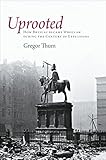Uprooted : How Breslau Became Wroclaw during the Century of Expulsions / Gregor Thum.
Material type: TextPublisher: Princeton, NJ : Princeton University Press, [2011]Copyright date: ©2011Edition: Core TextbookDescription: 1 online resource (552 p.) : 90 halftones. 2 mapsContent type:
TextPublisher: Princeton, NJ : Princeton University Press, [2011]Copyright date: ©2011Edition: Core TextbookDescription: 1 online resource (552 p.) : 90 halftones. 2 mapsContent type: - 9780691152912
- 9781400839964
- City and town life -- Poland -- Wrocław -- History -- 20th century
- Collective memory -- Poland -- Wrocław -- History -- 20th century
- Forced migration -- Poland -- Wrocław -- History -- 20th century
- Social change -- Poland -- Wrocław -- History -- 20th century
- World War, 1939-1945 -- Deportations from Poland
- World War, 1939-1945 -- Influence
- HISTORY / Europe / General
- 1940s
- Allied powers
- Allied victory
- Allies
- Breslau
- Central Europe
- Eastern Europe
- Europe
- Gdansk
- General Conservator
- German occupation
- German territories
- German territory
- Germans
- GermanАolish border
- Gnienzo
- Jan Zachwatowicz
- Joanna Konopinka
- Karol Maleczynski
- Krakow
- London Foreign Office
- Poland
- Poles
- Polish leaders
- Polish names
- Polish national cult
- Polish people
- Polish residents
- Polish settlers
- Polish state
- Polish takeover
- Polonization
- Potsdam Conference
- Poznan
- Second World War
- Soviet Union
- Soviet dismantling
- Szczecin
- Warsaw
- Washington State Department
- Wrocalw
- Wroclaw
- age-old Polish
- archival materials
- better future
- communist government
- cultural life
- discrimination
- ethnic Germans
- ethnic minorities
- forced migration
- forced migrations
- foreignness
- historians
- historic preservation
- historical names
- homogenous nation
- integration
- local history
- mass migrations
- modern society
- national border
- nonintervention
- patriotic appeals
- political map
- political power
- population exchange
- postwar Poland
- postwar challenges
- postwar history
- reconstruction
- renaming operation
- self-reassurance
- settlement boundaries
- settlers
- tradition
- transportation connections
- war
- wartime destruction
- western territories
- 943.852 23
- DK4780.3 .T4 2017
- online - DeGruyter
- Issued also in print.
| Item type | Current library | Call number | URL | Status | Notes | Barcode | |
|---|---|---|---|---|---|---|---|
 eBook
eBook
|
Biblioteca "Angelicum" Pont. Univ. S.Tommaso d'Aquino Nuvola online | online - DeGruyter (Browse shelf(Opens below)) | Online access | Not for loan (Accesso limitato) | Accesso per gli utenti autorizzati / Access for authorized users | (dgr)9781400839964 |
Frontmatter -- Contents -- Acknowledgments -- A Note on Names -- Prologue: A dual Tragedy -- Introduction -- PART ONE. The Postwar Era: Rupture and Survival -- Chapter One. Takeover -- Chapter Two. Moving People -- Chapter Three. A Loss of Substance -- Chapter Four. Reconstruction -- PART TWO. The Politics of the Past: The City's Transformation -- Chapter Five. The Impermanence Syndrome -- Chapter Six. Propaganda as Necessity -- Chapter Seven. Mythicizing History -- Chapter Eight. Cleansing Memory -- Chapter Nine. The Pillars of an Imagined Tradition -- Chapter Ten. Old Town, New Contexts -- PART THREE. Prospects -- Chapter Eleven. Amputated Memory and the Turning Point of 1989 -- Appendix 1. List of Abbreviations -- Appendix 2. Translations of Polish Institutions -- Appendix 3. List of Polish and German Street Names -- Notes -- Sources and Literature -- Map of Poland after the Westward Shift of 1945 -- Simplified Map of Wrocław Today -- Index
restricted access online access with authorization star
http://purl.org/coar/access_right/c_16ec
With the stroke of a pen at the Potsdam Conference following the Allied victory in 1945, Breslau, the largest German city east of Berlin, became the Polish city of Wroclaw. Its more than six hundred thousand inhabitants--almost all of them ethnic Germans--were expelled and replaced by Polish settlers from all parts of prewar Poland. Uprooted examines the long-term psychological and cultural consequences of forced migration in twentieth-century Europe through the experiences of Wroclaw's Polish inhabitants. In this pioneering work, Gregor Thum tells the story of how the city's new Polish settlers found themselves in a place that was not only unfamiliar to them but outright repellent given Wroclaw's Prussian-German appearance and the enormous scope of wartime destruction. The immediate consequences were an unstable society, an extremely high crime rate, rapid dilapidation of the building stock, and economic stagnation. This changed only after the city's authorities and a new intellectual elite provided Wroclaw with a Polish founding myth and reshaped the city's appearance to fit the postwar legend that it was an age-old Polish city. Thum also shows how the end of the Cold War and Poland's democratization triggered a public debate about Wroclaw's "amputated memory." Rediscovering the German past, Wroclaw's Poles reinvented their city for the second time since World War II. Uprooted traces the complex historical process by which Wroclaw's new inhabitants revitalized their city and made it their own.
Issued also in print.
Mode of access: Internet via World Wide Web.
In English.
Description based on online resource; title from PDF title page (publisher's Web site, viewed 29. Jul 2021)


